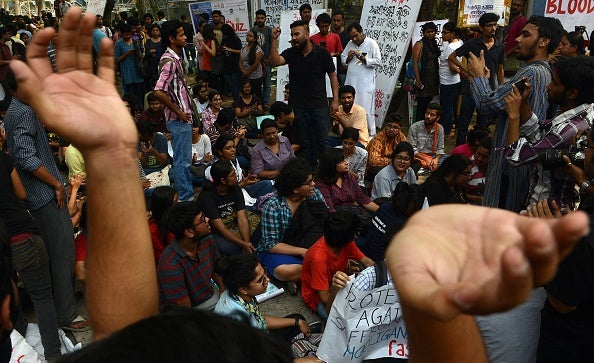The Independent's journalism is supported by our readers. When you purchase through links on our site, we may earn commission.
Kanhaiya Kumar: Indian Supreme Court refuses to hear students’ union leader’s bail plea
Local media reports say Supreme Court fears that, by allowing student's petition to go through, it would 'directly open floodgates of such requests in the future'

Your support helps us to tell the story
From reproductive rights to climate change to Big Tech, The Independent is on the ground when the story is developing. Whether it's investigating the financials of Elon Musk's pro-Trump PAC or producing our latest documentary, 'The A Word', which shines a light on the American women fighting for reproductive rights, we know how important it is to parse out the facts from the messaging.
At such a critical moment in US history, we need reporters on the ground. Your donation allows us to keep sending journalists to speak to both sides of the story.
The Independent is trusted by Americans across the entire political spectrum. And unlike many other quality news outlets, we choose not to lock Americans out of our reporting and analysis with paywalls. We believe quality journalism should be available to everyone, paid for by those who can afford it.
Your support makes all the difference.India’s Supreme Court (SC) has refused to hear the bail plea of students’ union leader Kanhaiya Kumar - whose arrest on sedition charges has sparked protests across the country - and has, instead, diverted the case to the Delhi High Court.
According to The Indian Express, the SC said on Friday that, if they did hear Mr Kumar’s bail plea, it would “directly open floodgates of such requests in the future” as demonstrators on campuses across the nation criticise the Hindu nationalist government for apparently trying to halt free speech.
Mr Kumar, president of Jawaharlal Nehru University (JNU) Students’ Union in New Delhi, was arrested and charged after alleged ‘anti-national’ activity on 12 February after some students held a rally against the 2013 hanging of Mohammed Afzal Guru, a Kashmiri separatist who was convicted over the 2001 Indian Parliament attack.
According to local media, the rally’s organisers had displayed posters across the university campus inviting students to gather for a protest march against the “judicial killing of Afzal Guru” and in solidarity with the “struggle” of Kashmiri migrants.
On Friday, though, the SC reportedly agreed Mr Kumar’s bail hearing may not be possible at the Patiala House court complex - after violence escalated outside the court on Wednesday, in which Mr Kumar was reportedly injured - suggesting he approach the city’s High Court instead.
In Wednesday’s incident, the student leader appeared in the court complex following the end of his police custody where a group of men, apparently dressed in lawyers’ robes, allegedly led an attack on him as well as on journalists in the waiting crowd.
The Indian Express reports how one of the lawyers, Vikram Singh Chauhan, was responsible for leading the attack and apparently used Facebook to gather support prior to the incident taking place. However, Mr Chauhan alleged it was a rival group who began the attack and said: “They are trying to beat us up and we don’t even respond?” reports Firstpost India.
A large group of lawyers, though, marched outside the courthouse on Friday in support of Mr Chauhan, and one told local media: “We are not goons. We are lawyers. We are protesting against the anti-national activities. The people involved in earlier incidents were not lawyers.”
The bail petition filed in the Supreme Court by Mr Kumar’s legal counsel on Thursday sought a “fair trial,” adding: “His lawyers fear the safety of their life and limb and are unable to present his case before the concerned court of law.”
Academics at universities from across the UK have been signing a ‘solidarity statement’ in support of Mr Kumar and the protests taking place at JNU.
Condemning the “illegal ongoing police action,” the open letter says: “Under Indian law, sedition applies only to words and actions that directly issue a call to violence. The peaceful demonstration and gathering of citizens does not constitute criminal conduct. The police action on JNU campus is illegal under the constitution of India.”
Mr Kumar’s bail plea will next be heard in the city’s High Court on Monday, according to The Indian Express.
Join our commenting forum
Join thought-provoking conversations, follow other Independent readers and see their replies
Comments